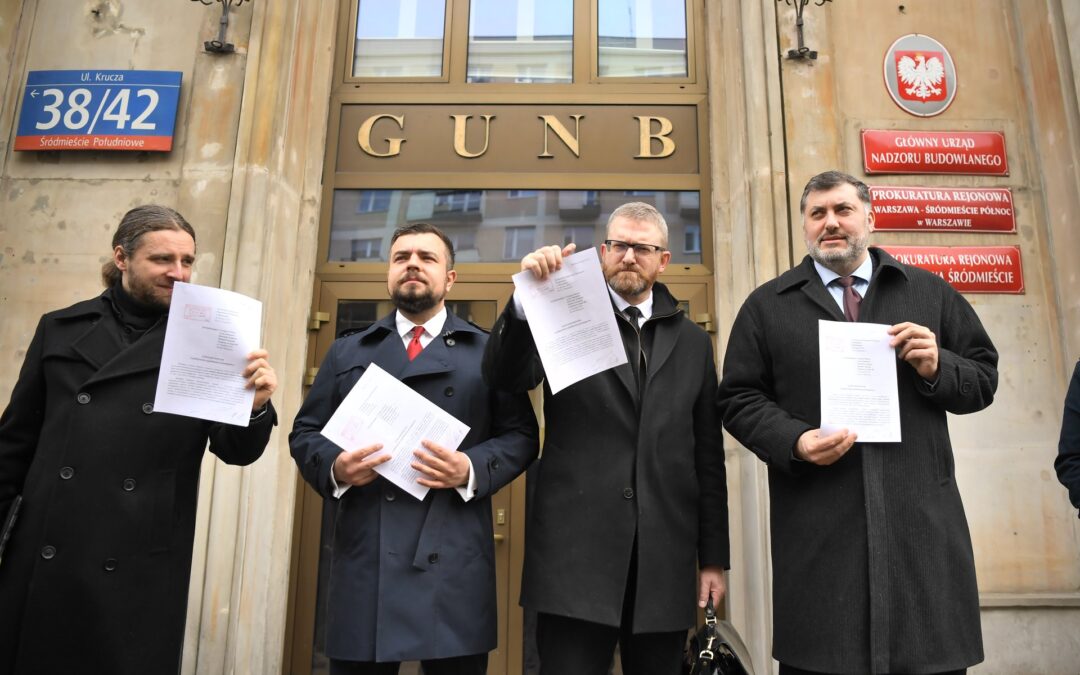The far-right Confederation (Konfederacja) party has notified prosecutors that the government’s handling of the pandemic and its lockdown rules, which they deem to be unlawful, have resulted in the loss of health, lives and livelihoods of people in Poland.
The party pins the blame directly on Prime Minister Mateusz Morawiecki, his chief of staff Michał Dworczyk, as well as the current health minister, Adam Niedzielski, and his predecessor, Łukasz Szumowski.
Confederation has, like many other far-right groups in Europe, been an opponent of Covid restrictions. Its leaders have appeared at anti-lockdown protests, and the party’s contingent of 11 MPs have previously refused to comply with face-covering rules in parliament.
At a press conference outside the Warsaw District Prosecutor’s Office on Monday, one of Confederation’s leaders, Grzegorz Braun, accused the ruling party politicians – whom he dubbed “the four horsemen of the apocalypse Anno Domini 2021” – of “damaging the health, property and life of the Polish nation”.
The accusations relate to article 165 of Poland’s criminal code, which foresees a sentence of between six months and eight years in prison for “causing danger to the life or health of many persons or property of a considerable value”.
“We are lawmakers, and we must not remain silent when the law is broken, abused, when the highest authorities of the Republic of Poland act without a proper legal basis,” said Braun, who has previously likened the compulsory wearing of masks to how the Nazis forced Jews to wear armbands as a first step on the way to ghettoisation and then death.
.@GrzegorzBraun_: Trzeba dostrzec przestępczy charakter działań podejmowanych nie w oparciu o prawo, ustawy i konstytucję, ale w oparciu o propagandowe narracje snute na kolejnych konferencjach prasowych rządu, które mają nastraszyć Polaków. Nie możemy milczeć! pic.twitter.com/BUQPB6w0j6
— Konfederacja (@KONFEDERACJA_) March 29, 2021
“We heard from the prime minister that we defeated the coronavirus because there was an election to win,” said another Confederation MP, Artur Dziambor, referring to a speech Morawiecki gave last year encouraging older voters (who were more likely to favour the ruling party’s candidate) to vote in the presidential elections.
“We heard from the health minister that masks did not work, later the same minister forced these masks [on us],” Dziambor continued. “Education has been completely destroyed, the errors and problems of health care have been exposed, the Polish economy is collapsing.”
Dziambor also noted that the prime minister and health minister promised that subsequent lockdowns would “not be as difficult” but have in fact led to the “demise of thousands of Polish companies” and hence “personal tragedies”.
In relation to claims of threatening lives, another MP from the party, Michał Urbaniak, claimed that the government has been a “bigger problem for Poles than coronavirus itself”. He said that in 2020 “37,000 more people died – compared to previous years – from diseases not related to coronavirus”.
“The government will sacrifice people to fight coronavirus,” he said. According to Eurostat data, in 2020 Poland recorded the highest rate of excess deaths among all European Union member states.
The country has now been hit hard by a third wave of the virus, with infections rising to their highest ever level and the government introducing tougher restrictions in response.
However, a series of court rulings have recently declared some restrictions to be unlawful, which commentators say will make the new measures harder to enforce.
Last week, the government faced criticism from within its own camp. Wojciech Maksymowicz, an MP from one of the junior parties in the governing coalition, and who is himself also a medical doctor and former head of the National Health Fund (NFZ), said that the current situation represents a “big failure” by the health minister, who is overseeing a “system [that] is not very well organised”.
Main image credit: Konfederacja/Facebook

Maria Wilczek is deputy editor of Notes from Poland. She is a regular writer for The Times, The Economist and Al Jazeera English, and has also featured in Foreign Policy, Politico Europe, The Spectator and Gazeta Wyborcza.




















